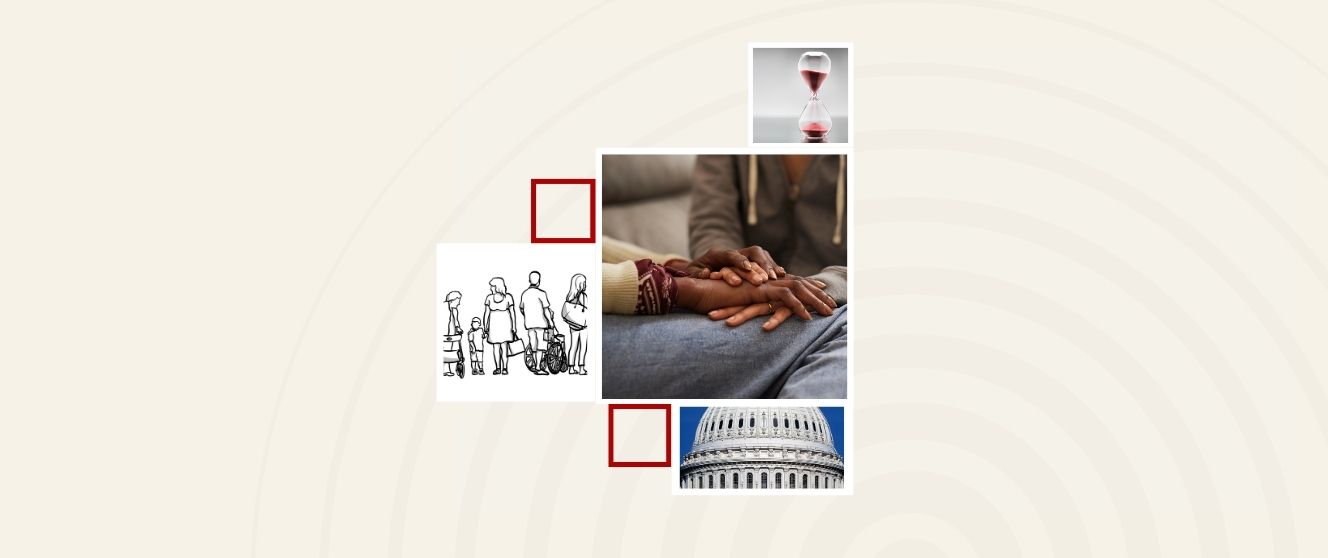
The federal government shutdown has entered its fourth week after Congress failed to pass a budget bill that would fund the government and address significant cuts to healthcare and Medicaid. House Speaker Mike Johnson has told Representatives to stay in their home districts, while the Senate has voted repeatedly to extend the budget without addressing major cuts to Medicaid and increases in health insurance costs for tens of millions of people. This is an update to our last post on the shutdown because we know this impacts many people with disabilities. Learn about ways to prepare for potential service disruptions, to take action, and to share your story.
The government shutdown prevents federal agencies from operating as usual and puts pressure on state and local budgets that are already hurting. The longer the shutdown continues, the greater the disruptions to the services we rely on will be. These are some of the potential changes you can expect in the coming days and weeks:
- Healthcare Cost Increases: Enrollment periods for Medicare and for Affordable Care Act (ACA) Marketplace plans are expected to open on November 1st. The ACA tax credits that help to make the plans more affordable are set to expire and have not been extended by Congress. As a result, millions of people who rely on ACA health insurance plans will see an increase in the cost of their health insurance. In some states, these cost increases will be very large and make insurance unaffordable. There are estimates of nearly 340,000 jobs lost if the tax credits expire.
- SNAP Benefits at Risk: Federal funding for Supplemental Nutrition Assistance Program (SNAP) food benefits may run out as soon as early November in some states. 42 million people are at risk of losing their access to food through SNAP. Many people are already at risk of losing access to their SNAP benefits as a result of HR 1, which became law in July. The Administration can take steps to ensure SNAP is available in November.
- WIC Benefits at Risk: The Special Supplemental Assistance Program for Women, Infants and Children (WIC) was at risk of running out of federal funds. The administration has shifted funds to keep it running for now.
- Federal Housing Benefits at Risk: The U.S. Department of Housing and Urban Development (HUD) will continue to make payments under previously obligated Section 8 contracts, Section 236 agreements, Section 202 and 811 Project Rental Assistance Contracts (PRAC), and Section 811 Project Rental Assistance (PRA) for as long as federal funds and reserves last. Housing Assistance Payments for current Section 8 voucher holders are expected to continue until November; however, new Section 8 vouchers will not be issued. Stay informed in case funding stops.
- Impacts on Medicare Enrollment and Services: You can still sign up for Medicare during the shutdown, but there are some things to consider, and you may not want to sign up until you have updated information. Please remember though that open enrollment ends on December 7, 2025. Some telehealth services through Medicare are not currently available or may not be covered by Medicare insurance.
- Delays in Accessing Federal Services: On Friday, October 10, the administration laid off 4,000 federal workers, including staff that ensure funding and provide assistance to states, schools and vocational rehabilitation programs for disabled children, students and adults, ensure access to housing without discrimination and support mental health and addiction programs nationwide. On October 15, a federal judge paused the layoffs to examine whether they are illegal. We are not sure how funds for these programs will be distributed to states in the meantime. Additionally, many federal workers are not working because of the shutdown, so updates or fixes to the Medicare plan websites may be delayed, and there may not be someone available to answer questions or process applications or appeals about Social Security, Medicaid, Medicare or other federal programs.
Affordable and accessible health care remains a human right. What’s at stake is higher health care costs for all of us and loss of coverage for millions of individuals and families.
Congress should reopen the government while extending the tax credits for the close to 24 million people, including people with chronic conditions, who rely on the credits to buy affordable health insurance through the ACA Marketplace. Congress should roll back the cuts it made in July 2025 to Medicaid, health care access, and other important benefits. Congress should understand the needs of the families and communities they represent. No one should have to wait longer, get sicker, or die because of barriers to healthcare, no matter what.
Take Action
Tell your story. Have a story to share? We invite you to tell us about how the shutdown, cuts to Medicaid or other agencies or programs, including housing and education, have impacted you and your families. Your stories make a difference and may be shared with Congressional offices and California state policymakers and highlighted on social media. Please complete this survey.
Learn more about the shutdown and impacts to ACA health insurance in your state at Keep Americans Covered. Here are steps you can take to prepare for federal benefits disruptions:
- Call your bank, creditors and utility providers if you are concerned your benefits will be cut. There is more information in this explainer by the American Association on People with Disabilities.
- Find your state WIC & SNAP webpages for more information about your food benefits.
- Check your eligibility for SNAP.
- Locate a food bank near you through Feeding America.
- Read about your rights as a tenant during the shutdown. If federal housing vouchers run out, you should keep paying your portion of the rent. Your landlord cannot increase your rent even if they stop receiving payments from the federal government during the shutdown.
Talk with your neighbors, friends and community about the impacts, how they can prepare, and what they can do to take action.
Contact your representatives. You can use one of the following forms to directly contact your member of Congress and tell them to fund the government and extend the tax credits now:
- Lower Health Care Costs Now | Families USA
- Tell Congress: Keep The Health Care Tax Credit | Keep Americans Covered
- Tell Congress to Cancel the Devastating Medicaid Cuts and Protect the Affordable Care Act! | Caring Across Generations
- Tell Congress to reject further ICE funding and to restore congressional oversight | Mom’s Rising
- Tell Congress to Fully Fund Federal Housing for People with Disabilities | The Kelsey
- DREDF Denounces Decimation of Critical Education, Housing, and Healthcare Staff, Calls for Action | DREDF Action Alert


